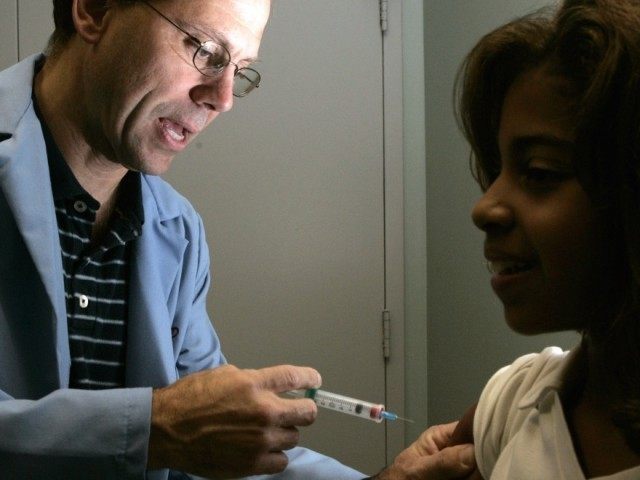Vaccination rates seem to be rising in California on their own–long before the state’s controversial new mandatory vaccination law takes effect in July 2016.
Only 2.54 percent of California Kindergarteners had “personal belief” waivers (PBEs) on file at the beginning of the 2014-15 school year–a non-mandated reduction from the prior year. Preliminary numbers for the 2015-16 school year are showing another voluntary reduction, to 2.33 percent, according to Bay Area public radio station KQED. That report also noted that vaccination rates explicitly rose for the measles, mumps and rubella (MMR) 2.04 per cent from 92.55 to 94.59.
Strangely, data published on December 24 to the California Department of Public Health (CDPH) website regarding vaccination rates for the 2015-16 school year were deleted after calls from reporters, according to KQED. The government agency claimed that the numbers were incomplete and that new numbers are to be published in January.
SB 277–the bill that brought parents and Californians from across the political spectrum out in force protesting against mandatory vaccinations–is scheduled to take effect on July 1, 2016, in time for the 2016-2017 school year. Kindergarten and 7th grade students will be required to have all required vaccinations or will be denied entry to private or public school. The only remaining exception will be for the small number of children given medical exemptions.
The trigger, both for the rise in vaccination and the new legislation, was an outbreak of measles late last year whose origin was pinned to the Disneyland theme park in Anaheim. “Patient Zero” never seemed to be located, but the illness spread across the state as well as at least seven other states and even a few cases in Mexico and Canada. In total, as of April 18–the end of the outbreak–there were just over 150 cases.
Just as the measles outbreak was subsiding in April, SB 277 was gaining steam. Democrat legislators Senator Richard Pan (Sacramento)–who is a medical doctor–and Ben Allen (Santa Monica) co-authored the bill. Criticism arose against Pan during the vaccine bill debate due to support he has received from special interests such as vaccine manufacturers.
Pan chalked the increase in vaccination rates up to “misinformation” that he says was brought to light during the debate over his vaccine requirement bill.
One of the pieces of information that came up during the debate was that pockets of California’s Bay area and Sonoma County with lower vaccination rates were found primarily to be comprised of graduate-level educated and low-income residents, a pattern mirrored throughout the state.
Legislators pushed a crop of new bills, including SB 277, in the wake of the measles outbreak.
Santa Monica pediatrician Jay Gordon, a Fellow with the American Academy of Pediatrics, testified in June against the SB 277 vaccine mandate. “SB 277 is not about whether vaccines are right or wrong….Should all children in California be forced to be fully vaccinated in order to attend preschool, day care, kindergarten or high school despite their parents’ personal, religious and medical beliefs?” he asked.
Gordon also pointed to new laws that already seemed to be achieving the voluntary vaccination rate increase effect that Pan and Allen claimed to be seeking by requiring consultation with a “health care practitioner”: “AB 2109 passed and has been in effect a little more than a year and it works.” KQED quoted Marin County public health officer Dr. Matt Willis for commenting that this is the third year of increased vaccination, calling it “great news.”
Follow Michelle Moons on Twitter @MichelleDiana

COMMENTS
Please let us know if you're having issues with commenting.